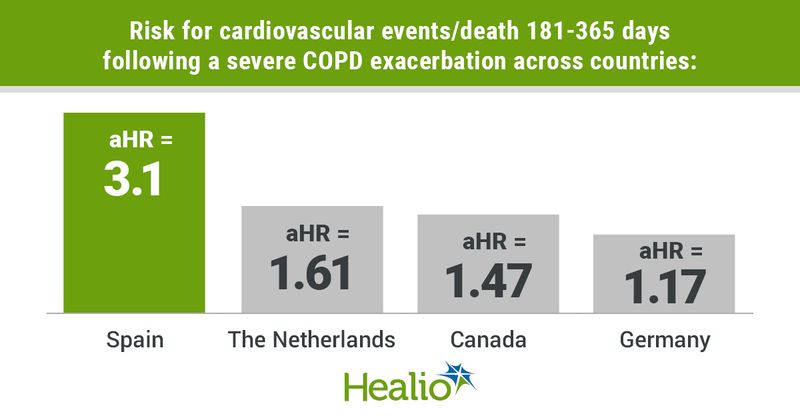Cardiovascular
COPD exacerbations heighten risk for severe cardiovascular events, death across countries
September 14, 2023
4 min read
Source/Disclosures
Vogelmeier CF, et al. Poster 3013. Presented at: European Respiratory Society International Congress; Sept. 9-13, 2023; Milan.
Disclosures:
Hawkins reports having financial relationships with AstraZeneca, Bayer, Boehringer Ingelheim, Novartis and Servier.
Key takeaways:
- Risks for a cardiovascular event/death were high after moderate and severe COPD exacerbations.
- This increased risk persisted for 1 year after a severe exacerbation and was observed across four countries.
Across four countries, the risk for a severe cardiovascular event or death was high 1 to 6 months after a moderate COPD exacerbation, according to a poster presented at the European Respiratory Society International Congress.
Further, severe COPD exacerbations led to substantially high risks for cardiovascular outcomes immediately following the exacerbation, with the risk persisting up to 1 year later.

Nathaniel Hawkins
“As health care professionals, we all need to be aware of the increased cardiopulmonary risk associated with an exacerbation,” Nathaniel Hawkins, MD, MPH, MBChB, study investigator and associate professor at the University of British Columbia, told Healio. “We need to focus on preventing exacerbations of COPD before they arise so we can avoid the consequence of cardiovascular events. We must take action to prevent exacerbations and when exacerbations occur to make sure that we do not have repeat exacerbations. Clinicians should assess the patient’s cardiovascular risk and do everything they can to treat and reduce that cardiovascular risk.”
In a multi-database cohort study, Claus F. Vogelmeier, MD, professor at Philipps University of Marburg, Hawkins and colleagues evaluated 126,795 patients (median age, 67 years; 60% men) from Germany, 142,787 patients (median age, 68 years; 51.7% men) from Canada, 8,020 patients (median age, 65 years; 52.7% men) from the Netherlands and 24,393 patients (median age, 68 years; 78.2% men) from Spain with COPD between 2014 and 2018 to determine the risk for a severe cardiovascular event within the 12 months after a moderate/severe exacerbation.
As Healio previously reported at the American Thoracic Society International Conference, the U.S. version of this study found that patients who experienced a COPD exacerbation had a greater risk for acute cardiovascular events than patients who did not.
Researchers defined a severe cardiovascular event as death or hospitalization for acute coronary syndrome, heart failure, arrhythmias or cerebral ischemia.
During median follow-up of 36 months (Germany, the Netherlands and Spain) and 58 months (Canada), researchers observed at least one moderate exacerbation among 26.6% of the Canadian cohort, 29.7% of the German cohort, 58.6% of the Spanish cohort and 23.3% of the Netherlands cohort.
The prevalence of one or more severe exacerbations was similar to that of moderate exacerbations in Canada (30.2%) and Germany (27%), whereas severe exacerbation occurred less frequently in Spain (9.5%) and the Netherlands (9.3%).
Among all countries, Germany had the highest percentage of patients who experienced a cardiovascular event/death (38.6%), followed by Spain (35.8%), Canada (30.5%) and the Netherlands (13.7%).
Notably, the risk for cardiovascular events/death was heightened in all four countries within 1 to 7 days after a moderate exacerbation, 8 to 14 days after and 15 to 30 days after. Within the span of 31 to 180 days after this type of exacerbation, researchers continued to find a high risk for a cardiovascular outcome/death among patients from Canada (adjusted HR = 1.13; 95% CI, 1.06-1.2), Germany (aHR = 1.08 95% CI, 1.04-1.13) and the Netherlands (aHR = 1.62; 95% CI, 1.26-2.08).
For those who experienced a severe exacerbation, the risk for cardiovascular events/death was highest immediately (1 to 7 days) after the exacerbation in all countries. Patients in the Netherlands had the greatest risk (aHR = 48.57; 95% CI, 36.88-63.96), followed by Canada (aHR = 24.88; 95% CI, 23.75-26.07), Spain (aHR = 24.22; 95% CI, 21.77-26.96) and Germany (aHR = 15.84; 95% CI, 15.26-16.45).
“The magnitude of the increased risk for cardiovascular events associated with exacerbations was surprising,” Hawkins told Healio.
Although not as high as the risks observed above, researchers continued to find elevated risks in all the evaluated timeframes within 1 year of a severe exacerbation. Within 181 days to 365 days after this type of exacerbation, patients from Spain had the highest risk (aHR = 3.1; 95% CI, 2.77-3.46), followed by the Netherlands (aHR = 1.61; 95% CI, 1.01-2.56) Canada (aHR = 1.47; 95% CI, 1.4-1.55) and Germany (aHR = 1.17; 95% CI, 1.11-1.23).
There are two main areas of future research, Hawkins told Healio.
“The first is we need to characterize the actual causes of that increased cardiovascular risk and try to understand what is happening to patients from a physiological perspective following that exacerbation,” he said. “To do that, we’re going to need to follow large numbers of patients who’ve had an exacerbation and investigate them very thoroughly.
“Second, we need to test strategies to avoid exacerbations and strategies to treat the cardiovascular risk once it’s actually happening,” he added.
With the findings from this study and the U.S. study, researchers hope to demonstrate the widespread importance of cardiovascular events among patients who experience a COPD exacerbation.
“One thing to highlight from this study is the importance of doing large population studies in multiple countries with diverse health care systems,” Hawkins told Healio. “What you see here is consistency in results, which help us realize that these are truly findings that are generalizable in different health care systems across countries.”
Reference:
For more information:
Nathaniel Hawkins, MD, MPH, MBChB, can be reached at [email protected].


